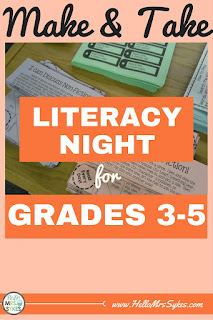6 Ways to Support Struggling Readers in grade 2-6
In chatting with teachers, I often get questions about how to support struggling readers in my upper elementary grades. Here are the top 6 ways I support struggling readers in grades 2-6. Thought I would pass them along. If you find them helpful, I appreciate your sharing this post with your colleagues. Thanks, y'all!!

- Find out their interests, then help them find tons of cool books on that topic. If the books are way too difficult a text, but have rich, engaging pictures, let them keep them in their reading box. If the majority of their books are at their reading level, let them keep a few that are interest-based, even if they are far too easy or difficult.
- Find out their needs, then help them find materials they can keep in their reading box. If they can't tie their shoes, find a preschool book with the big, chunky laces, and let them quietly practice during reading time. Yes, sometimes 4th graders don't know how to tie their shoes. It gives them practice with a life skill, they'll be using the pictures as a diagram to follow the directions. Win-Win! Books about telling time, tying shoes, and counting money are some I have used in the past. When you have a 9 year old 2nd grader who reads on a F&P level D (instead of J), you get creative.
- Find out what they are good at, and build their self-esteem. Particularly in Upper Elementary classrooms, struggling readers *know* they are struggling. They often feel frustrated at school because they are continually struggling, since they need to use their reading skills in math, social studies, science, health, etc. One year, I had an 3rd grade student who was already pulled for three acronym classes: ESL, CCR, ALP. When she qualified for speech, the class began during the last 5 minutes of our recess. I fought to keep those 5 minutes, arguing that she needed the time with her classmates. Here's my secret: I wanted to keep her there for every moment of our recess because this was the time of day when she was able to outshine her peers. (She was - and still is - an amazing athlete) Her joy at winning in kickball helped her stay engaged in our school community, and built her self-esteem. Let them have time to show their talents.
- Protect *uninterrupted* chunks of time to read independently. This is so important, because this is when they can practice the decoding, accuracy, and fluency strategies we are growing. Our struggling kiddos are having such a hard time transitioning from the Speech room to the English as a Second Language class to the Special Education class, and then back to the classroom. Often, the biggest loss is in their focus - how can you stay focused on that book if you don't get much time to read it? (or reread it!)
- Play games together. Pick one game and play it a few times a week for 2 weeks. Pick something quick, like Boggle (Click here for my classroom rules) or fun Word Games for Vowels. Spend 5 minutes a day, 3 times/week for a couple of weeks, to encourage a joy of looking at words. Tip: I often make sure we "run out of time" before we have a winner. They ask, "Who won, Mrs. Sykes?" I answer, "It's a game where we have fun with words, not a game where we have to have a winner each time." Then we move on...
- Most importantly, love them, celebrate their successes, and help them to love learning. It's why we choose to work with children, right?






I have a question that you might be able to answer since you are a literacy coach. I teach both fourth and fifth grade and have an incredible range of reading abilities. We complete a couple of research units throughout the year, and because we don't usually have books on everything that students choose to research, we use many internet resources. My struggle is always how to help my struggling readers with internet resources. I can read the material and discuss it individually but what do my other students do during that time? Any suggestions for strategies on finding lower leveled internet sources?
ReplyDeleteThanks for any help!
Janie
Are We There Yet?
Hi, Janie! I suggest you make friends with a fabulous media specialist to help find resources for your struggling readers! Online, I often find high interest, low readability information on Enchanted Learning. I hope that helps! Also, I've been known to steer kids to the topics that I know I have resources for... at least for their first ones. :)
Delete~Jen